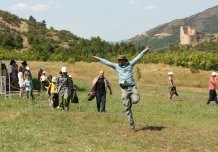
Dr Peter Leeming with Georgian pupils exploring an archaeological site
New support to put history, theology and archaeology back on the curriculum in Georgia
Teachers in Georgia are being given expert help to put history, archaeology and theology back on the curriculum and address a chronic shortage of curators and archaeologists following the fall of communism.
Experts from the University of Exeter, working with the National Museum of Georgia, are helping cash-strapped schools use historic treasures to show children the fascinating past of their country.
It is hoped the training and new resources will encourage more young people to continue to study history, archaeology and theology and raise the profile of these subjects, which would help to solve the acute lack of experts in these areas in Georgia.
Since the fall of communism in 1991 the curriculum in Georgia has had to be completely re-written to ensure children learn previously forbidden subjects such as theology, but schools have not had access to training and resources to support them during this process.
Historian and archaeologist Professor Emma Loosley, from the University of Exeter and archaeologist Dr Peter Leeming, a recent graduate from the Department of Archaeology at the University of Exeter, have been working with Darejan Dzotsenidze, Head of Education at the National Museum of Georgia and her colleagues to help schools. They have produced new free resources, organised training for teachers and given children the chance to be archaeologists for a day. The support highlights Georgia’s key role in history. It is the oldest site in the world known to have hominid remains outside of Africa.
Teachers have visited the National Museum of Georgia, in Tbilisi, learning how to incorporate museum collections and field trips into their classes to make history seem relevant and exciting. New information packs about the treasures in the National Museum have been produced to help them.
During one recent training session teachers were trained in how to talk about the flora and fauna at the time that early humans lived in Georgia, and how the ancient Georgian alphabet could be used to discuss language and theology, and analyse religious symbols. A new guide to a key Georgian archaeological site, ancient churches and a prehistoric cemetery are also now available.
The work is supported by the Georgian Ministry of Education and funded by the University of Exeter.
Three groups of children spent a morning touring key archaeological sites before learning how to excavate in the afternoon. The day ended with a meal and ‘awards’ where they received a specially printed baseball cap and T-shirt, with the logo “არქეოლოგია ყველასათვის” or “Archaeology for all/everyone” in Georgian and a certificate of attendance.
Professor Loosley said: “Georgia has a rich and fascinating history and we are really enjoying helping teachers explore this so they can help their students become enthused about the past, and see the career options open to them in history, archaeology and theology in the future.”
Hard copies of the resources are available (while stocks last) from the Education Department of the Simon Janashia State Museum of Georgia. In addition all four titles have been posted to the museum website and can be downloaded as free PDFs at http://museum.ge/index.php?lang_id=GEO&sec_id=95. These resources are currently only available in Georgian but English versions are expected to be made available in the future for the use of international schools and other foreign educational groups.
Date: 1 September 2017
